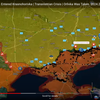Mér fannst þetta forvitnilegt og ég les þetta þegar ég hef tíma.
Þið lesið þetta fyrir mig núna og komið lagi á veröldina, ég kem á eftir.
Það er auðvelt að þíða þetta hér í programinu.
If I can't advertise it like that, I'll take it out right away.
The York Times
https://www.nytimes.com/
Turmoilat OpenAI
TIMES INSIDER
A Conversation With Sam Altman, Cast in a New Light
Two podcast hosts recorded an interview with the chief executive of OpenAI. Two days later, he was fired.
- 27



Times Insider explains who we are and what we do and delivers behind-the-scenes insights into how our journalism comes together.
In early November, a few days before a meeting of developers at OpenAI, the journalist Casey Newton bumped into Sam Altman, the company’s chief executive, at a birthday party. Mr. Altman had an idea: They should discuss “the future.”
Mr. Altman had been on a glide path to Silicon Valley pre-eminence since last November, when OpenAI burst onto the scene with ChatGPT, a chatbot powered by artificial intelligence. The next technological shift had arrived, and Mr. Altman was the face of it.
Mr. Newton, who with Kevin Roose hosts “Hard Fork,” a New York Times technology podcast, didn’t hesitate. The two interviewed Mr. Altman on Wednesday, Nov. 15, in their San Francisco studio. They planned to publish the conversation the day after Thanksgiving on an episode of “Hard Fork.”
But on Friday, Nov. 17, two days after their interview, the board of OpenAI fired Mr. Altman.
“It was like, Oh God, what does this mean for what we just recorded?” Mr. Newton said in an interview.
The news of Mr. Altman’s ouster rocked Silicon Valley and sent journalists in pursuit of breaking developments. By Saturday, Mr. Altman was in talks to return to OpenAI. By Monday — coincidentally the day “Hard Fork” published its interview — Microsoft had announced Mr. Altman would lead a research group there. Soon, hundreds of OpenAI employees threatened to leave and join Mr. Altman at Microsoft.
And then late Tuesday, less than four days after he had been fired, OpenAI announced that Mr. Altman would return as chief executive and the board would be overhauled.
In an interview with Times Insider hours before Mr. Altman’s reinstatement, Mr. Newton and Mr. Roose discussed why his (brief) ouster was so shocking, and how it had changed the way they think about artificial intelligence. This conversation has been edited.


You interviewed Sam Altman last week and were probably eager to get that material to your audience. Then Friday arrives: He’s out at OpenAI. What was your immediate reaction?
CASEY NEWTON Disbelief. It didn’t make any sense. We had just talked to the guy 48 hours earlier, and he seemingly had no indication that this was coming. OpenAI was riding high, on top of the world, and all of a sudden he’s fired. The blog post from OpenAI didn’t even really explain why — it just insinuated some things without really saying anything. So my first reaction was, What is happening? Shortly after that, Kevin and I hopped on a Google Meet with the podcast team to figure out what we were going to do.
Did you worry that the news would blow up the interview, which you had yet to publish?
KEVIN ROOSE Obviously the best thing would have been to interview him about all of this after it happened, to get his take on it. But we couldn’t do that. We just happened to have this very fresh interview with him in which he didn’t know he was about to get fired. But he did talk about a lot of the issues that we have since learned are at the heart of the conflict between him and the board of OpenAI. To me, it felt revelatory, illuminating and urgent to get it out as soon as we could.
Did you detect any hint of the rift?
NEWTON I wish I could tell you that I knew, but I don’t think any of us knew.
ROOSE No, absolutely no indication that this was coming. The reporting that we have since then backs up the fact that this was a complete surprise to him and to everyone except those on the board.
Which parts of the interview did Mr. Altman’s ouster cast into new light?
ROOSE It was clear to me that Sam was trying to walk a careful line between these two warring factions in the A.I. world: You could call them the optimists, the people who think that this technology should move faster, and the pessimists, the people who think that it’s already moving too fast. Sam was trying to be very thoughtful and deliberate about aiming down the middle of that debate. But he was very clear with us that he believed this technology needed to move faster. I thought that was illuminating at the time he said it, and even more so after he was fired, because, while we still don’t know the exact cause of the firing, it seems to have been a source of conflict within OpenAI.
Based on the reporting over the past few days, does this drastic move by the board make you reconsider the speed of artificial intelligence technology and how it will change the society around us?
ROOSE To me, it crystallized something that I have been trying to communicate in my columns and on our podcast for months now, which is that the people who are building A.I. technology are not motivated by the things most business people are. This is less an industry than a religious movement. And I say that with no condescension. They don’t approach advanced artificial intelligence as someone who went to business school would, as a cost-benefit calculation. They have feelings that are deeply ideological and personal. Some of them think they are building a new God. In the context of that world, something like what happened at OpenAI makes a lot more sense than if it’s just a routine business transaction.
How do you explain the insular world of Silicon Valley to a broad readership?
NEWTON We have the advantage of this being a really crazy human story. Technology stories sometimes get really tedious when you’re talking about the technology itself. It can be hard to understand. This is easy to understand. Everybody knows somebody who’s been fired. So I think this was a moment where the world, who has already been interested in A.I., is starting to learn. And I’m glad there’s an appetite for it because I think it’s really important.
- 27







Bæta við athugasemd [Innskráning]
Ekki er lengur hægt að skrifa athugasemdir við færsluna, þar sem tímamörk á athugasemdir eru liðin.